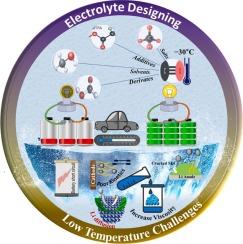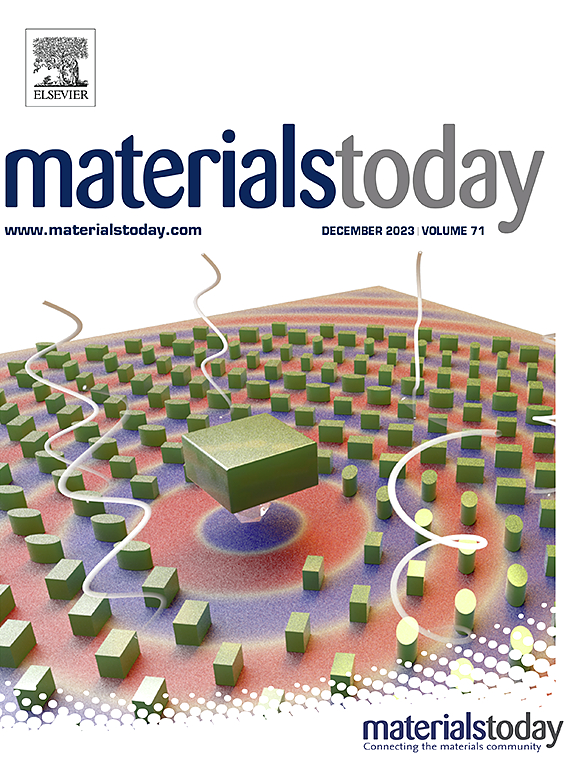Unlocking low temperature-resistant lithium metal batteries: Mechanisms, challenges, AI and functional electrolytes design
IF 22
1区 材料科学
Q1 MATERIALS SCIENCE, MULTIDISCIPLINARY
引用次数: 0
Abstract
Lithium metal batteries (LMBs) represent a viable substitute for lithium-ion batteries (LIBs), particularly for next-generation electric vehicles (EVs), aerospace applications, and grid storage solutions. However, their application in low-temperature environments is significantly constrained by several issues, including sluggish ion transport, inadequate electrode kinetics, electrolyte freezing, lithium dendrite formation, and solid electrolyte interphase instability (SEI) variability. This study offers comprehensive and innovative analysis that integrates unique electrolyte design techniques and newly created AI-assisted models to tackle significant issues in low-temperature lithium metal batteries (LT-LMBs). This review explores the enhancement of LT-LMB performance by functional electrolytes through the facilitation of ion-conductive SEI, inhibition of lithium dendrite development, and reduction of adverse reactions. The study comprehensively examines the current research environment, including innovative electrolyte formulations, sophisticated characterization methods, and theoretical insights into innovative electrolyte-induced interfacial changes. The study also reviews AI models that facilitate the rapid operation of batteries employing low-temperature electrolytes for LMBs and their future potential. The research examines the limitations and problems of existing electrolyte functionalization technologies and potential future designs for high-performance LT-LMBs. This study thoroughly examines breakthroughs in low-temperature electrolytes and directs the progression of next-generation lithium metal batteries for practical use in challenging conditions.

解锁耐低温锂金属电池:机制、挑战、人工智能和功能性电解质设计
锂金属电池(lmb)是锂离子电池(lib)的可行替代品,尤其适用于下一代电动汽车(ev)、航空航天应用和电网存储解决方案。然而,它们在低温环境中的应用受到几个问题的严重限制,包括离子传输缓慢、电极动力学不足、电解质冻结、锂枝晶形成和固体电解质间相不稳定性(SEI)可变性。这项研究提供了全面和创新的分析,结合了独特的电解质设计技术和新创建的人工智能辅助模型,以解决低温锂金属电池(lt - lmb)的重大问题。本综述探讨了功能性电解质通过促进离子导电SEI、抑制锂枝晶发育和减少不良反应来增强LT-LMB的性能。该研究全面考察了当前的研究环境,包括创新的电解质配方,复杂的表征方法,以及对创新电解质诱导界面变化的理论见解。该研究还回顾了有助于lmb低温电解质电池快速运行的人工智能模型及其未来潜力。该研究考察了现有电解质功能化技术的局限性和问题,以及高性能lt - lmb的潜在未来设计。这项研究彻底检查了低温电解质的突破,并指导了下一代锂金属电池在具有挑战性条件下实际应用的进展。
本文章由计算机程序翻译,如有差异,请以英文原文为准。
求助全文
约1分钟内获得全文
求助全文
来源期刊

Materials Today
工程技术-材料科学:综合
CiteScore
36.30
自引率
1.20%
发文量
237
审稿时长
23 days
期刊介绍:
Materials Today is the leading journal in the Materials Today family, focusing on the latest and most impactful work in the materials science community. With a reputation for excellence in news and reviews, the journal has now expanded its coverage to include original research and aims to be at the forefront of the field.
We welcome comprehensive articles, short communications, and review articles from established leaders in the rapidly evolving fields of materials science and related disciplines. We strive to provide authors with rigorous peer review, fast publication, and maximum exposure for their work. While we only accept the most significant manuscripts, our speedy evaluation process ensures that there are no unnecessary publication delays.
 求助内容:
求助内容: 应助结果提醒方式:
应助结果提醒方式:


